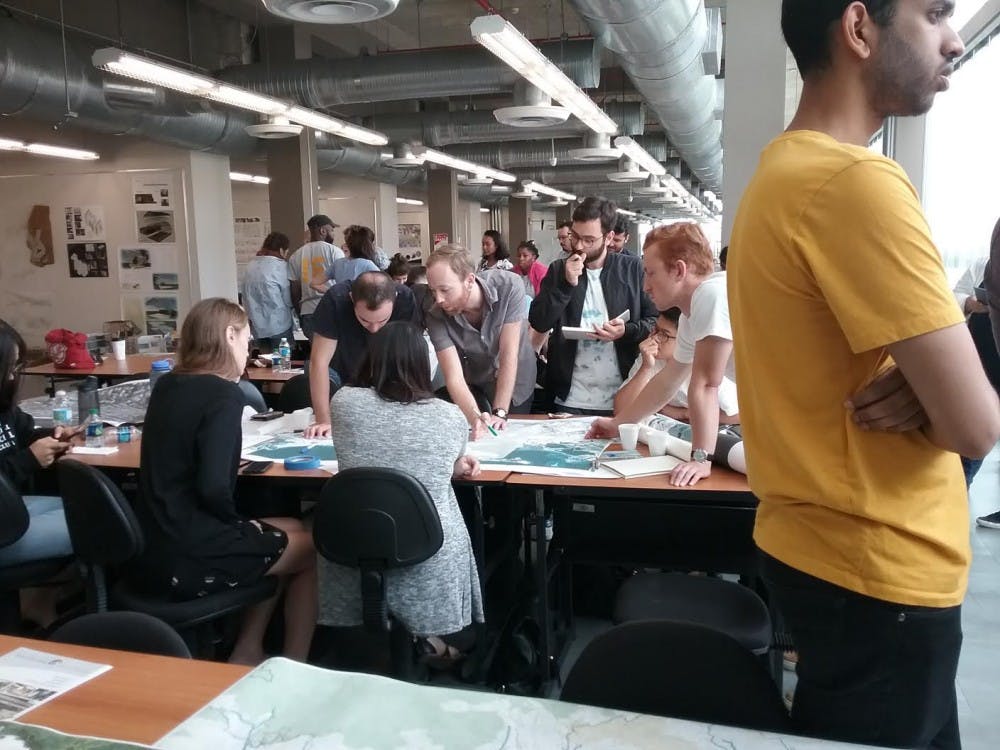Puerto Rico is still struggling to recover after being devastated by hurricanes last year, but students and faculty in Penn’s School of Design are hoping to bolster the relief process and make the island stronger than ever before.
PennDesign students and faculty have recently returned from a trip to Puerto Rico as part of their disaster relief research and infrastructural improvement design efforts in the wake of hurricanes Irma and Maria.
Graduate students at Penn’s School of Design involved in the City and Regional Planning and Landscape Architecture programs traveled to Puerto Rico following an initial research phase of the infrastructural issues facing the island that were aggravated by the hurricanes.
The week-long trip, which ran from Sept. 29 to Oct. 7, saw participating students and faculty analyze three focus locations and collaborate with local disaster relief officials and partners at the University of Puerto Rico and Universidad Politécnica de Puerto Rico to shape disaster relief strategies.
The Puerto Rico trip contained a range of academic opportunities and research-intensive tasks for PennDesign students.
The trip included a day-and-a-half long intensive work session, in which teams of participating students collaborated with local experts to produce potential strategies for the three sites to rectify these long-standing infrastructural issues. The work produced by the students in Puerto Rico will serve as the foundation for continued research and development at Penn.
“We had teams of students brainstorm opportunities and strategies for these three sites, working with invited experts from our network of contacts,” said Nicholas Pevzner, a senior lecturer in the Department of Landscape Architecture. “It was astonishing just how much great work was produced in just over one day.”
PennDesign faculty leaders also organized a one-day symposium of local experts and government officials in Puerto Rico, who discussed the issues facing the island in the aftermath of the disaster. The symposium consisted of presenters from a variety of professional fields, including members of FEMA, architects, economists, and policymakers.
RELATED:
History among the headstones: PennDesign prof leads tour at local Woodlands cemetery
PennDesign, the most tuition-dependent graduate school, faces unique financial challenges

Although the PennDesign efforts in Puerto Rico were motivated by Hurricane Maria, the students and faculty hope to have greater impacts than just immediate disaster relief.
Assistant Professor of City and Regional Planning Allison Lassiter said that, in addition to making the island more “resilient to large disasters,” PennDesign studios are looking to develop “longer term strategies that holistically deal with a whole set of issues in Puerto Rico.”
“We started getting involved because of the hurricane, but it turns out the hurricane is just one of many problems there,” Lassiter said. “We’re looking for a long-term redevelopment strategy that has to do with being prepared for disasters, but that’s only one piece of the whole story.”
Pevzner said Hurricane Maria exposed “larger economic and social demographic crises” that had been afflicting Puerto Rico in the decades prior to the disaster. Island-wide blackouts, energy failures, and water contamination were among the results of exacerbated infrastructural, environmental, and economic problems in the wake of the hurricane.
The post-hurricane aggravation of Puerto Rico’s weak infrastructure, particularly of its water quality, took “a toll on health for people,” said Sarah Gaines, a graduate student in the School of Design who went to Puerto Rico with the Landscape Architecture studio. “A lot of people in the aftermath of Maria died of waterborne illnesses.”
Gaines said that, although she was amazed by how she and her peers benefited from the trip, she was particularly struck by how experts from multiple facets of government and academia were able to collaborate in pursuit of solving the systemic issues facing the island.
“How often do all of these people get together in one room and talk about issues that each of them have a slightly different perspective on?” Gaines said. “I think the more we try and solve these issues from a multidisciplinary approach, the better it will be for everyone.”









